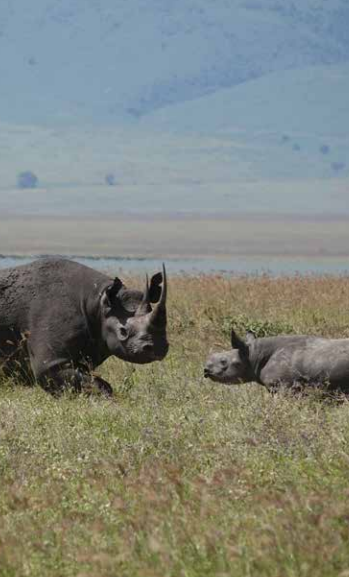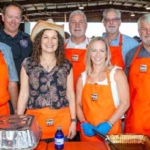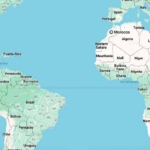Unhistoric Acts: Hidden Medical Efforts in Conservation by Tim L. Tetzlaf
by Tim L. Tetzlaff, Director of Conservation,
Naples Zoo at Caribbean Gardens
In a quiet treatment room, the patient lies still beneath anesthesia. The surgical team leans close. No flashing warning lights, rushing bodies, or urgent shouts that lend weight to the importance of what’s happening now. This is just one of the unseen medical efforts in saving species.
 Conservation is often imagined as something that happens in faraway savannas or rainforests. And while Naples Zoo works there too, conservation medicine is also practiced right here in the Glass Animal Hospital, a few steps from where our guests watch orangutans swing and play. The scene above has played out over a dozen times in the last year as Naples Zoo’s veterinarian Dr. Kelsie Stovall and her team surgically implant tracking devices in invasive Burmese pythons to aid research and removal efforts in hopes of restoring what’s already been lost in Florida. Our hospital has stored biological samples of Florida panthers and served as the starting point for two new pharmacology studies that will help properly treat giraffes both in and outside the wild.
Conservation is often imagined as something that happens in faraway savannas or rainforests. And while Naples Zoo works there too, conservation medicine is also practiced right here in the Glass Animal Hospital, a few steps from where our guests watch orangutans swing and play. The scene above has played out over a dozen times in the last year as Naples Zoo’s veterinarian Dr. Kelsie Stovall and her team surgically implant tracking devices in invasive Burmese pythons to aid research and removal efforts in hopes of restoring what’s already been lost in Florida. Our hospital has stored biological samples of Florida panthers and served as the starting point for two new pharmacology studies that will help properly treat giraffes both in and outside the wild.
Far from Naples, crucial bloodwork data commonly available in your neighborhood vet clinic for domestic cats and dogs are often unavailable to help the world’s rarest species. To rectify that, Naples Zoo and our supporters have funded two sets of blood chemistry analyzers, identical to what we use in our hospital. These units have been field tested, as another set of these is already in use helping giant anteaters and giant armadillos in Brazil. This fall, Dr. Kelsie Stovall and I will be traveling to Africa to deliver and set up these new sets.
The first set will be delivered to wildlife veterinarian Dickson Wambura at Tanzania’s Ngorongoro Conservation Area Authority. Ten new monitoring foot collars purchased by the zoo will be placed in upcoming months. Blood collected will allow the veterinary team to assess both individual and population health.
The other set will be used by the Madagascar Fauna and Flora Group to give veterinarians the precious data they need to care for the thirteen species of endangered lemurs at Parc Ivoloina as well as the confiscated lemurs that often arrive in ill health. Dr. Stovall will also be training the Parc’s animal care team on key practical veterinary skills.
While less dramatic than larger efforts we’ve supported like giraffe translocations or outfitting rangers with new vehicles and observation outposts, the immediate impacts of accurate diagnostics for an animal in distress or key research data are critical brush strokes in the larger picture in recovering the natural world. And this is often the case. As stated near the end of the 19th century British novel Middlemarch:
“The growing good of the world is partly dependent on unhistoric acts; and that things are not so ill with you and me as they might have been, is half owing to the number who lived faithfully a hidden life, and rest in unvisited tombs.”
In our conservation work, and in many aspects of all our lives, our greatest impacts often come not from dramatic moments, but from the quiet work faithfully carried out, the hidden lives devoted to detail, and the choices we make to support them. In Naples, those unhistoric acts are shaping the survival of species across continents.
Contact me at tim@napleszoo.org
To learn more or support these efforts, visit NaplesZoo.org/conserve
Together, we can create a brighter, more resilient future for people and wildlife
 Naples Zoo at Caribbean Gardens is a private 501(c)(3) nonprofit entrusted with educating families and caring for rare species in a century old historic garden. Since 2014, Naples Zoo has invested over $3.5 million saving plants and animals in the wild and fully funds the annual salary of 27 field staff in 7 countries including three wildlife veterinarians.
Naples Zoo at Caribbean Gardens is a private 501(c)(3) nonprofit entrusted with educating families and caring for rare species in a century old historic garden. Since 2014, Naples Zoo has invested over $3.5 million saving plants and animals in the wild and fully funds the annual salary of 27 field staff in 7 countries including three wildlife veterinarians.
To learn more about how you can invest in a better future for people and wildlife, email tim@napleszoo.org




Leave a Reply
Want to join the discussion?Feel free to contribute!